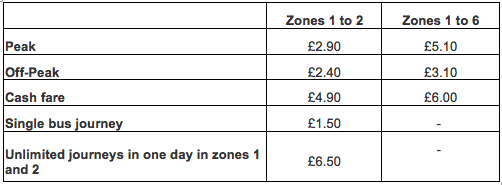Transportation:
Ticketing Methods
Oyster Cards
The Underground (Tube), city buses, over-ground rail and river buses utilises the same ticketing system – Oyster Cards (credited smartcards). You can get an Oyster card at stations for a £5 refundable deposit. The Oyster card is the simplest, cheapest and easiest way to commute and pay for journeys on buses, Tube, trams and National Rail Services. Find out how and where to top up your Oyster here!
Credit deductions are based on the following:

Travelcards
While the Oyster Card is generally recommended for students, another form of paying for transportation is via Travel cards -- paper tickets purchased at the Visitor Shops without the need of photo IDs. Travel cards allow you to travel as much and as often as you like in specific zones that you paid for. If you purchase a travel card that is valid in zones 3-6, the travel card will be valid for trams in those zones as well.
| Child Day Off-Peak Travelcard | Adult 7 Day Travelcard | Child 7 Day Travelcard |
Zones 1-6 | £6.00c | £59.10 | £29.60 |
Main Transportation Modes
Tube (Underground)
Although the Underground does not connect every part of the city, it is one of the fastest and most convenient ways to get around. Things may get complicated with an extensive Underground system made up of 16 lines. Hence, access to London’s Tube map here or find out the handy smartphone apps that you should own!
Flying Chalks’ recommendation: Citymapper is free and has information on most of the transport modes available in London.
Tube lines run all through the night on Friday and Saturday nights, which is great news if you are intending to stay out late during the weekends. Parts of the Underground are usually closed during the weekends for maintenance work. Do check this page to make sure your route is available before leaving the house!
Flying Chalks' tips:
- Always use your Oyster card when taking the tube instead of buying a single-trip ticket! A trip within Zone 1 during the off-peak periods would cost £2.40 with the Oyster card. The same journey would cost you £4.90 with single-trip tickets.
- Students aged 16-25 qualify for a 30% discount for rides on the tube when they purchase the National Railway Card and link it up with their Oyster card!
- London’s Underground has partnered with Virgin Media to provide WiFi to commuters. For more information on its WiFi service, click here!
National Rail / Train
If you travel often, do check if you are eligible for a 16-25 Railcard and receive a 30% discount on train journeys. If you are travelling in a group, do check this page to see if your group qualifies for a discount. Remember to book your tickets in advance as tickets bought on the day of departure will cost way more. However, advanced bookings will limit your travel dates hence do plan your journeys well!
Details about London’s National Rail fares can be found here.
Buses

This logo is displayed on the buses in London. Bus travel cheaper than taking the tube. London’s bus map/ routes can be found here! More information on London’s bus services can be found here! If you are using the Oyster card to travel within London, do note that buses operate through a one-time payment method of £1.50 per journey, regardless of distance. There is no need to tap out when you get off.
Flying Chalks’ tips:
- Do not worry if you are not sure if there is sufficient money in your Oyster when taking the bus. Your card can run in the negative for one trip when you tap in. Simply grab a receipt and remember to top it up straight after!
- Cash payments are not accepted on buses; you will need an Oyster card, or a contactless bank card.
- Do check the Transport for London (TfL) website/Twitter page for updates on the transport network. Alternatively, plan your journey on Google Maps/Citymapper as they are updated with real-time information from TfL.
Coaches
Coaches run from stations in London to various locations within England and Europe (e.g. Paris). Click here to view the full list of coach companies available. Two of the most popular companies are Megabus and National Express. Tickets can be bought at stations or online.
Taxis
Taxi is the most convenient mode of transport and this is especially so when you have a lot of baggage. Taxi fares are charged according to distance travelled and duration. In the UK, “Black Cabs” are the licensed to pick up passengers through “public hire”. Taxi fares are especially expensive in London. The full list of standard taxi fares can be found here. Do check out their webpage here and take note of their safety tips.
Flying Chalks' recommendation: The most popular option is to use Uber.
Private Hire / Minicab
These are car services that must be booked by telephone unlike the “Black Cabs”. They are generally slightly cheaper than the “Black cabs” as fares are calculated based on the total distance travelled. However, do be wary of unlicensed minicabs. If you are found travelling in one, you will also be charged with an offence!
Santander Cycles
“Hire, Ride, Return”. Hire bicycles for short trips from as little as £2 from Santander Cycles with a credit card! On top of that, no bookings are required and returns can be made to any docking station. Click here for more information on Santander Cycles. Click here to find a docking station. The payment system can be found here.
Flying Chalks' tip: Audio maps for London’s transport system can be accessed here.
Transportation options that are more suitable for tourists
Trams
Trams operate on a pay as you go basis. Each ticket costs £1.50 when using the Oyster. Unlike buses, single-trip tickets can be purchased from ticket machines located in tram stops at a standard price of £2.60. Tram Passes can be bought at the following rates:
Contactless and Oyster | Contactless | Oyster | ||||
|---|---|---|---|---|---|---|
Pay as you go | Daily cap | Monday to Sunday cap | One Day Bus & Tram Pass | 7 Day Bus & Tram Pass | Monthly Bus & Tram Pass | Annual Bus & Tram Pass |
£1.50 | £4.50 | £21.20 | £5.00 | £21.20 | £81.50 | £848 |
London’s Tram network map can be found here. More information on tram fares can be found here.
River Buses
London’s River buses operate on eight piers along Thames. Travel card users are eligible for a 1/3 discount when purchasing adult or child fare tickets while Oyster’s pay-as-you-go users can enjoy 10% off single fares. More information on London’s River services can be found here. London’s River services map can be found here.
Banking Services:
There are branches of HSBC, Santander, RBS and Lloyds Bank located on Tottenham Court Road, within a 5 minutes’ walk from the main quad.
To set up a bank account, you will be required to provide the bank with:
- Passport or national photo ID card (EU citizens)
- Proof of student status – with updated UK address and contact number
In order to obtain your proof of student status, you will first need to complete enrolment in UCL during induction week. You can then obtain a proof of student status from the Student Centre in the Chadwick Building (to the right of the Gower St entrance) – but make sure you’ve updated your contact details on Portico before that!
Once a bank account (savings or current account) is open, the bank will usually issue you a debit card, and a PIN and dongle for phone or online banking.
Each bank has different requirements on opening a bank account, with differing minimum balances and service charges. Do visit the British Bankers’ Association (International Students) (BBA) for more information or download the BBA International Students guide to help you choose the bank that is most suitable for you!
Flying Chalks' tips:
- It is recommended that you make an appointment to open an account with the bank, especially with popular banks like HSBC as they get very busy during the September-October period.
- Even if you make an appointment, be prepared for a 1-2 weeks’ wait as all international students will be setting up their accounts at the same time
- Make sure you bring sufficient cash to tide you through the first 2-3 weeks in London. Setting up a UK bank account and transferring money can take more time than expected.
- Bank branches are very specific about the format of the documentation they will accept, so check with them the exact requirements so you will not make a wasted trip
For Singaporeans:
Alternatively, you can choose to set up your UK account in Singapore via HSBC at least 1.5 months before departure. Do note that a processing fee will be involved and this process takes at least 4 weeks hence do check with your preferred bank for more details!
Major Banks in the UK:
1. Barclays Bank (Recommended by City University)

Procedures:
1. Students would usually receive an introductory letter from Barclays during the orientation.
2. Book an appointment with Barclays and obtain a formal document with the address of your UK residence, proof of enrolment and personal identification. You will be able to set up a Barclays Student Bank account at no cost after providing these documents to the bank!
Homepage: Barclays International Students Account
Locations: Locate a Branch
Customer Service: Contact Barclays Bank
2. Lloyds Banking Group
.png)
Locations: Locate a Branch
International Students Guide
Customer Service: Contact Lloyds Bank
3. HSBC

Homepage: HSBC Student Banking and Basic Bank Account
Locations: Locate a Branch
Customer Service: Contact HSBC
4. NatWest

Homepage: Banking for International students
Locations: Locate a Branch
Customer Service: Contact NatWest
5. The Royal Bank of Scotland

Homepage: Banking for International students
Locations: Locate a Branch
Customer Service: Contact RBS
Flying Chalks' tip:
- All major banks in the UK share the same ATM machines (also known here as cash points) and will not charge you additional fees should you use your card to draw money from another bank’s ATM. Do note, however, that some ATMs (especially those in news agents) will charge a small fee for withdrawing cash.
- The biggest denominations dispensed by ATM machines are £20 notes. Should you need to withdraw a significant amount of cash for travelling, you can get your £20 notes changed to £50s at the bank.
- We recommend that you create a bank account in Lloyds, HSBC or NatWest as the services are very good. The banks are usually opened from from 9AM- 5PM on weekdays. Each bank has different opening hours during the weekend.
Money Exchange Services
Thomas Exchange offers very competitive rates as compared to airports and other money exchange offices. Order the amount you want in any currency online, and you can collect it at any of their branches in Bishopsgate, Oxford Circus, Baker Street and Kings Cross on the same day.
Post office Services:
The nearest post office to UCL is the Marchmont Post Office opposite The Brunswick mall (10 min from UCL), where you can make returns for online purchases or send mail. The post office also sells essentials like tape or envelopes.
Costs for International postage can be found here!
UCL’s Address:
Gower Street
London WC1E 6BT
United Kingdom
Medical services:
If you’re staying in a university hall, they will recommend you to register with a General Practitioner, usually the Gower Street Practice. You can do this online, or by filling in the form provided at hall registration.
Gower Street Practice is only open for a few hours on weekdays for walk-in consultations, or you can make an appointment over the phone or online. However, be cautioned that you might have to wait weeks for a free appointment slot. Additionally, GPs in the UK do not dispense drugs. You will need to buy and pay for your prescription medicine at a pharmacy (such as Boots and Superdrug). If you need urgent medical attention, the A&E department at University College Hospital is across the road from the main quad, and is open 24 hours a day, every day.
Medicine
Over-the-counter drugs can be bought at pharmacies such as Boots! You can locate the nearest store here! Should you require specific prescribed drugs, bring along your doctor’s prescriptions (name and brand of drug). Do ask for a receipt for any future insurance claim!
All international students registered on full-time courses for more than 6 months are eligible for NHS treatment:
- ONLY UK nationals are eligible for NHS. However, if your full-time course of study in England, Wales or Northern Ireland is for 6 months or more, OR if you are studying in Scotland (duration does not matter), you will automatically be eligible for free NHS hospital treatment like residents of the UK!
- 11-month short-term student* route: If you were not asked to pay the immigration health surcharge when your entry clearance application was made, you will not have to pay hospital fees (Free hospital treatments). Do note however, that the waiver of the “immigration health surcharge” is only temporary. It will be implemented again, in future.
- "Overseas Visitor" route: If you are an ‘overseas visitor’ do make sure that you have medical insurance coverage as you will be charged 150% of the usual tariff!
Click here for more information!
Telecommunications:
There are 16 mobile network providers in the UK. Most students in the UK subscribe to the pay-as-you-use monthly service. This is a cheap option that provides much flexibility, as students can suspend their line anytime. It is best to check which network offers the best coverage in your area when deciding which network to subscribe to. This website shows you the coverage of each network.
Some telecommunications companies may require a credit check before providing you with a mobile contract. They would expect you to have a credit history (eg. live in the UK for at least 6-months) and would require documents such as a UK bank account and proof of residence in the UK. This option is not recommended for students who have just arrived, or are only staying for a short while.
Here are some of the biggest telecommunications companies in the UK:
1. Vodafone

Vodafone UK offers “Vodafone Free SIM” with “Big Value Bundles” that allows you to top-up, earn reward points, and cancel at any time! It functions like a “pre-paid” SIM card.

Another option is the “SIM-only Bundle” that requires you to pay monthly. You can only choose from a 30 days or a 12 months contract.
“Suggested” 30day Contract Options | |||||
Monthly Cost | £11.50 | £14 | £17 | £19 | £25 |
UK Data | 250 MB | 500 MB | 1 GB | 5 GB | 10 GB |
UK Minutes | 250 | 500 | 100 | 500 | 500 |
| UK Texts | Unlimited | Unlimited | Unlimited | Unlimited | Unlimited |
| “Suggested” 12-Month Contract Options | |||||||
| Monthly Cost | £9.50 | £12 | £15 | £17 | £18 | £22 | £23 |
| UK Data | 250 MB | 500 MB | 1 GB | 5 GB | 2GB | 4 GB | 10 GB |
| UK Minutes | 250 | 500 | 1000 | 500 | Unlimited | Unlimited | 500 |
| UK Texts | Unlimited | Unlimited | Unlimited | Unlimited | Unlimited | Unlimited | Unlimited |
**Do note that not all available contracts are shown in the tables above. Do check their website for more information.
2. O2
O2 UK also offers “Pay as you go SIMs” with “Big Bundles”
| £10 | £15 | £20 | £25 |
UK Data | 500 MB | 1 GB | 2 GB | 4 GB |
UK Minutes | 250 | 750 | 1500 | 3000 |
UK Texts | 1000 | 2000 | 4000 | 4000 |
O2 UK offers “Pay Monthly SIMs”. You can only choose from a 30 days or a 12 months contract.
30-DAY Contract Options | ||||||
Monthly Cost | £12 | £14.50 | £17.50 | £20.50 | £24 | £30 |
UK Data | 250 MB | 500 MB | 1 GB | 2 GB | 4 GB | 8 GB |
UK Minutes | 250 min | 500 min | 1000 min | Unlimited | Unlimited | Unlimited |
UK Texts | Unlimited | Unlimited | Unlimited | Unlimited | Unlimited | Unlimited |
12-Month Contract Options | ||||||
Monthly Cost | £10 | £12.50 | £15.50 | £15.50 | £22 | £23 |
UK Data | 250 MB | 500 MB | 1 GB | 2 GB | 4 GB | 8 GB |
UK Minutes | 250 min | 500 min | 1000 min | 1000 min | Unlimited | Unlimited |
UK Texts | Unlimited | Unlimited | Unlimited | Unlimited | Unlimited | Unlimited |
3. EE
EE UK offers plans ranging from “Pay as you go Data Plans”, “Pay as you go Plans”, “Monthly/Pay as you go SIM only” and “Pay as you go packs”
30 Days Pay as you go Data Plans (No calling / texting) Options | ||||||
Price | £2 | £5 | £10 | £15 | £20 | £30 |
Data | 100 MB | 300 MB | 1 GB | 2 GB | 4 GB | 10 GB |
Speed | 4G | 4G | 4G | 4G | Double 4G | Double 4G |
30 Days Free Pay as you go EE SIMs | |||
Price | £10 | £10 | £20 |
Data | 500 MB | - | 1 GB |
UK Minutes | 150 min | 250 min | 50 min |
Text | Unlimited | Unlimited | 50 |
There are 3 types of Pay as you go packs: “Everything Packs (30 days talk text and data)”, “Talk and Text Packs (7/30 days talk and text)” and “Data packs (7/30 days Data, talk and texts)”!
30 Days Monthly EE Phone SIMs | ||||||
Price | £12.99 | £15.99 | £17.99 | £20.99 | £24.99 | £27.99 |
Data | 250 MB | 500 MB | 1 GB | 2 GB | 4 GM | 6 GB |
UK Minutes | 250 | 500 | 1000 | Unlimited | Unlimited | Unlimited |
Text | Unlimited | Unlimited | Unlimited | Unlimited | Unlimited | Unlimited |
Speed | 4G | 4G | 4G | Double 4G | Double 4G | Double 4G |
4.Three Mobile
There are 44 SIM only plans available at Three Mobile. These plans provide users with unlimited texts, 4G at no extra cost, hotspot allowances and usage abroad at no extra charges!
Top 5 30-days economically friendly plans | ||||||
Price | £11 | £14 | £14 | £19 | £19 | £19 |
Data | 500 MB | 1 GB | 2 GB | 1 GB | 4 GB | 4 GB |
UK Minutes | 200 | 600 | 200 | Unlimited | 600 | Unlimited |
Speed | 4G | 4G | 4G | Double 4G | Double 4G | Double 4G |
Flying Chalks’ recommendation: Unless you use your phone a lot, purchase the Pay as You Go plan (PAYG) from Three mobile as it is cheaper, easier and more flexible! PAYG comes in £10 for 1GB of data and £20 for 12GB of data. Do keep an eye out for promotions for their 12-month contract plans. You might end up saving more.
Other than the service providers mentioned above, you can also consider GiffGaff. It is an online-only provider, which means they do not have a physical store for you to make purchases. Ordering a SIM card from GiffGaff online is simple and fast. They also offer excellent deals. Its plans offer greater flexibility as you are not tied to a 2-year contract.
User Opinions
Flying Chalks’ basic summary of the service providers:
- Vodafone: very popular and offers free streaming services and try-before-you-buy data schemes.
- O2: Has long-running customer reward schemes and discount offers.
- EE: Has the best coverage in the UK, with 4G speeds up to five times faster than 3G.
- Three: Cheap calls, generous data allowances and free overseas roaming in 18 countries with ‘Feel At Home’ plan; ideal if you are planning on visiting other countries during your time in the UK.
Weather:
The weather in the UK is unpredictable and differs daily. Seasons usually overlap and don’t follow regular patterns. Temperatures and climates vary in the different parts of the UK. You should expect colder and windy weather higher up North and wetter weather in the West.
Spring
Enjoy the blossoming of spring and thaw out the remnants of winter’s cold between March to May. This is also the period where days are stretched longer with unpredictable showers so it is wise to keep an umbrella close to you. Temperatures fluctuate between 9.3oC – 15.4oC and daylight lasts between 11-15 hours.
Summer
This is the warmest season in the UK and it takes place between June and August. It is also coupled with the occasional thunderstorm. This is when you lose your coats, bring out your sunglasses, hit the beach and bathe in the sun. Temperatures range between 18.1oC – 20.6oC, sometimes reaching 30oC. Daylight normally lasts around 16 hours. Do protect your skin from the harsh UV even though it might not feel humid!
Autumn
This season is usually experienced from September to November. You will observe falling leaves and experience dipping temperatures. Early autumn can sometimes feel warm like summer while it can get very cold in November. Temperatures range from 18oC – 9.5oC and daylight lasts between 10-14 hours.
Winter
Temperatures fall in Winter and morning frosts are common. The holiday season begins in December and lasts through February. Winter in the UK is typically wet and windy. This is also the season with shortest daylight hours, lasting between 8-9 hours. Temperatures range from 6oC to 7.5oC, sometimes even plunging close to freezing point (0oC). While snow is not very common, it did snow in some years. Click here or here to find out more. Find out where are the 10 best places to visit during winter.
Flying Chalks’ recommendation: It is important to always bring an umbrella with you wherever you go, because it rains very often in the UK. Do consider bringing along a sturdy umbrella that can withstand strong winds. Check the weather forecast on a regular basis.
IMPORTANT NUMBERS | |
The general nationwide emergency hotline that can be used to call for an ambulance, fire truck or police (Call only when it’s an emergency – crime in progress, life-endangering/ violence/ threatening situations). No charges apply. | 999 |
The number to call for less urgent matters (report crimes, stolen car, damaged property) costs 15 pence per call | 101 18001 101 (Textphone for the hearing impaired) |
Non-Emergency medical number | 111 |
Reporting Terrorist Activity | 999 or 0800 789 321 |
Tourist Complaint Hotline | 0845 300 6996 |
Flying Chalks’ tip: When you do not have signal on your phone, you will still be able to make emergency calls using other available networks! Also, it is advisable to use the roadside phones if you meet an emergency on the highway.
Here is a list of embassies should you require urgent assistance!


